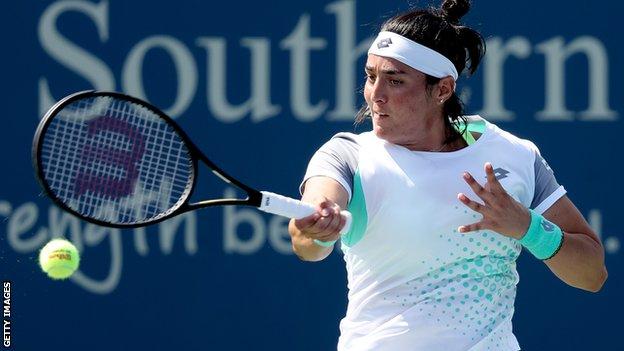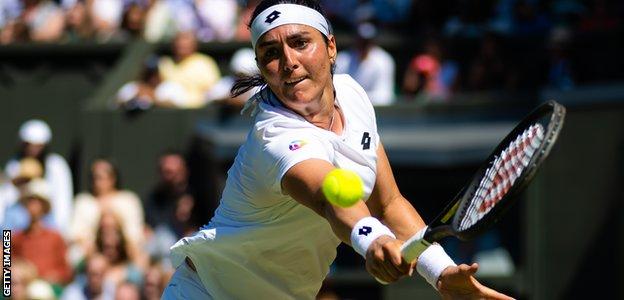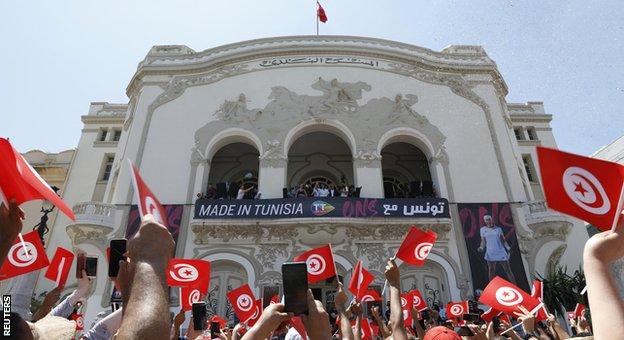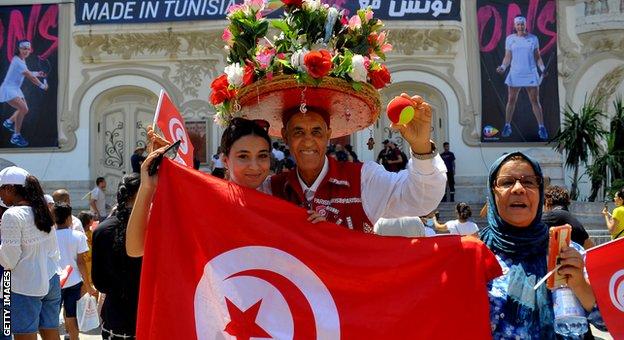Ons Jabeur: Tunisian on death threats after playing Israeli opponents

Enjoying the admiration of the Tunisian public following her historic run to the Wimbledon final, Ons Jabeur may have allowed a wry smile at her changed popularity in her home country.
Just two years earlier, Jabeur – who last month became the first African and Arab woman to reach an Open-era Grand Slam final – had been branded a traitor by some Tunisians, to the point where she even received death threats.
“It’s been a very tough time for me,” the 27-year-old told BBC Sport Africa.
“People threatened me with death because I played [a tennis match].”
Next week, the world number five repeats and follows her bid for a first Grand Slam title at the US Open Loss to Kazakh opponent Elena Rybakina in South West London.
Her entry into the final earned her a reception at the Tunisian President, where the incumbent Kais Saied proclaimed her the “Champion that Tunisia had honored” and presented her with the Order of Merit in recognition of her achievements.
“You are an idol for young Tunisian men and women,” Saied told her.
It was a notable contrast to February 2020, when Tunisia’s foreign ministry announced that Jabeur had acted against “the official position of the Tunisian state”.
your offense?
Representing your country against an opponent designated by the International Tennis Federation (ITF) in today’s Billie Jean King Cup.
A match that was “not just tennis”.
The problem was that the opponent in question was from Israel, a country that the North African nation – out of solidarity with the Arab country of Palestine – does not recognize.
“Any form of relationship with the Zionist entity, even when it comes to sports competitions, is rejected,” the ministry said in a statement.
“The participation of the women’s national tennis team in a match with the Israeli occupying forces is seen as a violation of Tunisia’s commitments to the just Palestinian cause.”
In the past, the Tunisian Tennis Federation (TTF) has been known to issue strict instructions to some players in a similar situation, such as when it ordered Malek Jaziri to withdraw from a match against a male Israeli opponent in 2013.
The ITF saw this decision Suspend Tunisia from Davis Cup for one year.
A month before Jabeur’s clash, the waters were already hot when a politician called for a national inquiry after Aaron Cohen played three games in Tunis as Israel’s representative, having entered the country on a French passport.

Despite this, Jabeur felt compelled to fight both her singles and doubles matches with the Israeli opponents in the Finnish capital, Helsinki.
“I’m not sure if anyone on the outside could understand that, but I can say it was a very serious issue – it just wasn’t a tennis match anymore,” she recalled. “We had a very difficult time.”
“We received death threats, so it was serious. The news was on social media.”
So why, given the context and the story, was she acting, defying traditional Tunisian conventions?
“Of course it was a very difficult decision,” she explains.
“Everyone knows that we support Palestine and I hope Palestine will be free very soon. It’s hard to see children die every day, but the choice wasn’t mine.
“They didn’t give me the option to play or not to play. I know if I didn’t play I would be fined. And I might get stopped [from playing] for two or three years.”
So she played and won both games to advance Tunisia’s cause in the world of international women’s tennis – even if it came at a daunting price for herself.
“It wasn’t easy, but we had to keep going.”
In May, during a run that saw her become the first Arab woman to win a WTA 1000 title, at the Madrid Open, Jabeur spoke out against mixing politics and sport when asked about the ban on players from Russia and Belarus in Wimbledon.
She then referred to her experience in Helsinki, saying – at the time – that she had “always been told… never to mix the two”.
“That’s why I said not to mix sport and politics because it was a very difficult time,” says one woman Nickname “Minister of Fortune” from their followers at home.
Jabeur’s experience in 2020 has made her more determined than ever on her views – with Tunisia saying she was “confused” when players from Russia and Belarus were banned from Wimbledon.
“I know my position very well. Sport is meant to be peaceful – certainly not to support war or anything else.”
Jabeur ‘a sensation’ in Tunisia

Today, Jabeur has progressed to the point of putting them second in the world on the eve of Wimbledon, where this year ranking points were annulled over the decision to ban the Russians and Belarusians.
This was the highest rank ever attained by an African or Arab, male or female.
During Wimbledon itself, Tunisia went mad for tennis, says local reporter Souhail Khmira.
“People tuned in to see Ons on TV. It was all over social media, dominating the newscasts and has been the highlight of these weeks,” Khmira told BBC Sport Africa.
“People are much more interested in tennis now, which was never really the case. Talking about tiebreaks and holding serves is a language that Tunisians are not used to but are learning. Jabeur was one during Wimbledon Sensation.”
In the course of her rise, she has enormously increased the popularity of the sport in her homeland – not only in terms of participants but also in terms of gender – with many more girls and women than ever before.
“We cannot thank her enough,” TTF President Salma Mouelhi Guizani told the BBC.
“She (has) brought joy and happiness to every Tunisian household. She waved the Tunisian flag and raised us high.
“I’ve been to London and seen the love from everyone cheering for Ons. When you see everyone clapping for her from all over the world, this is the best picture for Tunisia.
“Thanks to the results of Ons we are now up and running with strong motivation. The whole nation is proud. We as an association are very grateful.”
As President Saied wishes her every success in the future – one that will continue in New York next week when she bids for a first Grand Slam title – Jabeur seems to be the remarkable influence she is having on Arabic and African tennis , only to be able to further strengthen it.
